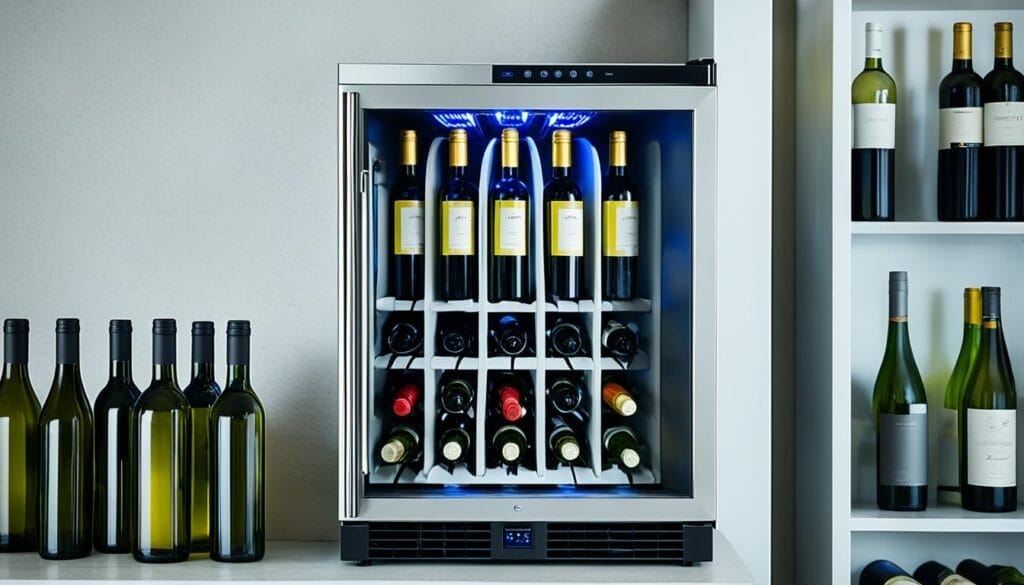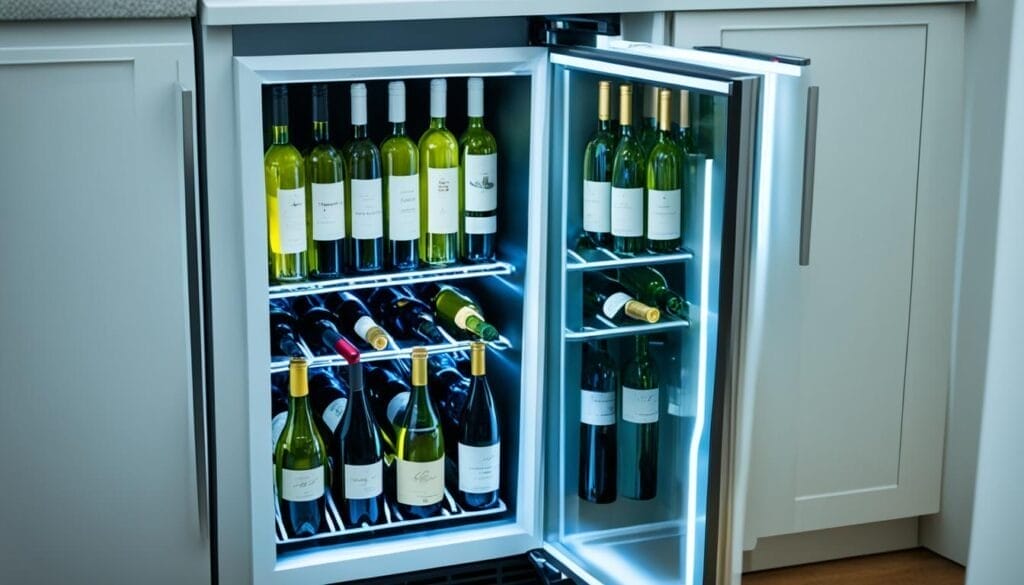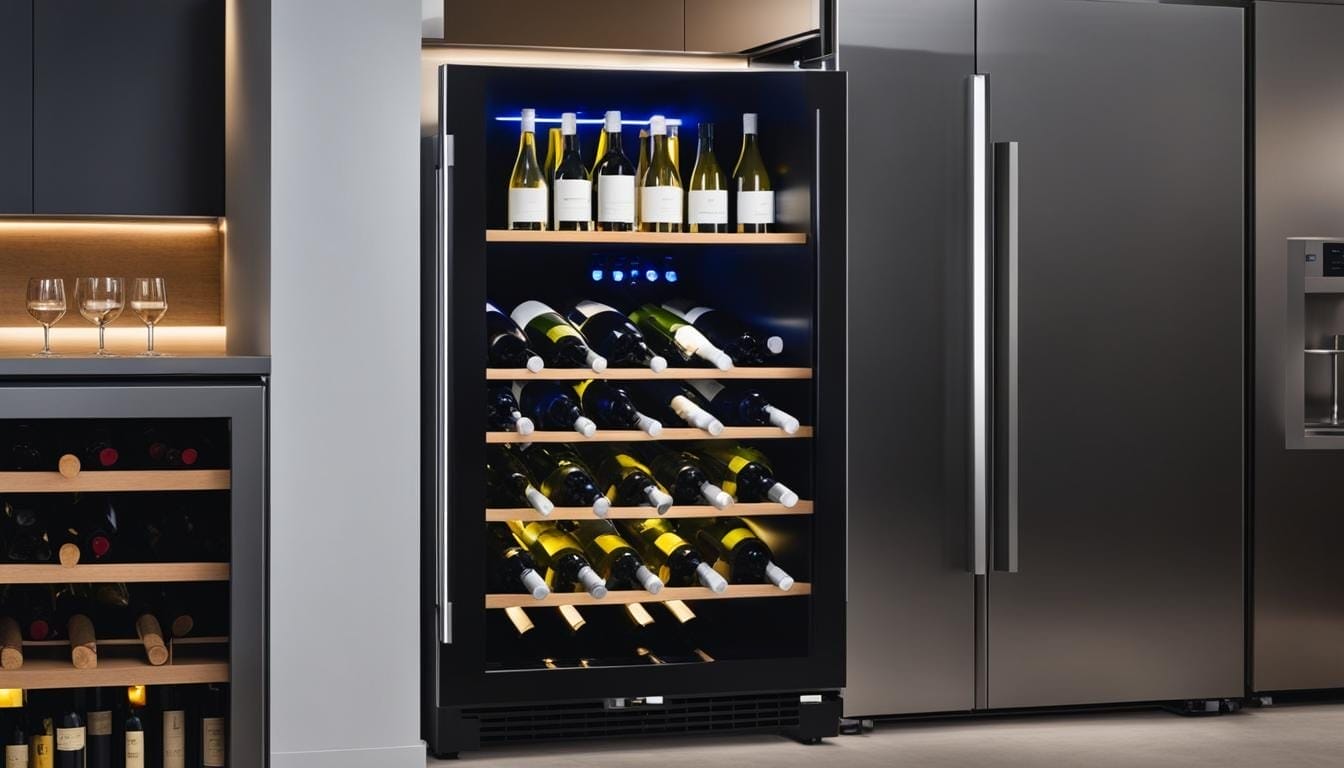Whether you want to savor an unopened bottle or make the most of a bottle that has already been opened, understanding the lifespan of white wine, how long it will last can help ensure a delightful experience. Let’s get into the details!
Key Takeaways:
- Unopened white wine lasts longer than opened wine.
- The shelf life of unopened white wine varies depending on the type and storage conditions.
- Storing unopened white wine in a cool and dark space helps preserve its quality.
- Opened white wine can last a few days to a week in the fridge, depending on the type.
- Proper storage, such as using wine stoppers or vacuum preserver corks, can extend the freshness of opened white wine.
Opened White Wine Lifespan In The Fridge
Opened white wine lifespan in the fridge can vary depending on the type of wine.
- Full-bodied whites like Muscat or oaked Chardonnay may oxidize faster than lighter varieties.
- To extend the freshness of opened full-bodied whites, vacuum-sealed corks can be used.
- These corks can help preserve the quality for 3-5 days when stored in the fridge.
- Lighter whites can last for a similar duration or even up to a week if properly sealed.
While it is possible to keep opened white wine in the fridge for several days, do note that slight flavor changes may occur due to oxidation. By following proper sealing techniques, you can help minimize these changes and preserve the quality of your opened white wine.
| Wine Type | Duration In Fridge (properly sealed) |
|---|---|
| Full-Bodied Whites (e.g., Muscat, oaked Chardonnay) | 3-5 days |
| Lighter Whites | 3-5 days or up to a week |
Unopened White Wine Lifespan In The Fridge
Unopened white wine can last for years past its best-by date. The key to preserving the quality and freshness of unopened white wine lies in the way it is stored. By storing unopened white wine in the right conditions, you can extend its lifespan and enjoy it at its best.
Ways To Store Unopened White Wines
What is the best way to store unopened white wines? There are two options that can provide optimal storage conditions:
- Fridge Storage: Storing unopened white wine in the fridge can help maintain its freshness. The cool temperature slows down the aging process and preserves the flavor. Make sure to keep the wine in the main compartment of the fridge and not in the door, as the temperature fluctuates more in the door.
- Cool & Dark Space: If you don’t have enough space in the fridge, storing unopened white wine in a cool and dark space, such as a wine cabinet, wine cooler, or wine cellar, is also an excellent option. These environments provide stable temperatures and protect the wine from light exposure.
Different Types Of White Wine Lifespan
Now let’s take a look at the shelf life of different types of white wine. Keep in mind that these are general guidelines, and individual bottles may vary:
| Type of White Wine | Approximate Shelf Life |
|---|---|
| Sauvignon Blanc | 3-5 years |
| Chardonnay | 3-7 years |
| Riesling | 5-10 years |
| Pinot Grigio | 3-5 years |
| Moscato | 3-5 years |
The shelf life of unopened white wine may vary depending on the type of wine.
- Remember to always check the best-by date and use your judgment when it comes to the quality of unopened white wine. If it tastes off or has any signs of spoilage, it’s best to discard it.
- With proper storage, unopened white wine can last for years, allowing you to savor its flavors and enjoy a delightful drinking experience whenever you choose to open a bottle.

Storing White Wine After Opening
After opening a bottle of white wine, it is important to store it properly to maintain its freshness. Proper storage can help preserve the flavor and quality of the wine, ensuring an enjoyable experience with each sip.
1. Vertical Storage For Spillage Prevention & Sediment Settling
- When storing opened white wine, it is recommended to store it vertically to prevent any potential spillage.
- Storing the bottle upright allows any sediment to settle at the bottom, ensuring a clearer pour when serving the wine.
2. Using Wine Stoppers Or Vacuum Preserver Corks
When storing opened white wine, using wine stoppers or vacuum preserver corks can help protect the wine from oxidation and extend its shelf life.
These accessories create an airtight seal, preventing air from entering the bottle and spoiling the wine.
- Re-cork the bottle tightly
- Store the opened white wine in a cool and dark place, away from direct sunlight
- Avoid extreme temperature fluctuations
- Minimize exposure to oxygen
3. Storing Opened White Wines In The Wine Fridge
- Ensure that you re-cork it tightly to create a seal that prevents excess air from entering the bottle and causing oxidation.
- Place the opened white wine in the wine fridge, away from direct sunlight. Consistent cool temperatures help slow down the oxidation process and preserve the wine’s characteristics.
- Using wine stoppers or vacuum preserver corks can help create an airtight seal, reducing the wine’s exposure to oxygen and extending its shelf life.
Sparkling Wine Storage
When it comes to sparkling wines like Champagne, Sekt, Riesling and Prosecco, preserving the freshness and fizz is key.
- Once opened, sparkling wines can quickly lose their effervescence. However, unopened sparkling wines have an impressive shelf life that can extend past the expiration date.
- After opening a bottle of sparkling wine, it’s crucial to take proper storage measures to keep it as lively as possible.
- One effective method is resealing the bottle with a wine stopper and storing it in the refrigerator. This can help preserve the bubbles and flavors for an additional few days.
Do note that not all sparkling wines react the same way to storage.
- Champagne, with its higher carbonation levels, can typically last up to three days when resealed and refrigerated.
- Sekt may last 3 – 4 days.
- Riesling and Prosecco may lose their fizz faster, lasting only a day or two once opened.
To preserve the quality and freshness of sparkling wines, investing in a suitable storage solution is essential.
- Wine coolers or wine cellars are excellent options for keeping your bubbly in optimal conditions.
- These storage units provide the right temperature and humidity levels, ensuring that your sparkling wine maintains its sparkling charm even after opening.

How To Tell If Wine Has Gone Bad
Unsure if your wine has gone bad? There are several indicators to help you determine if your wine is no longer drinkable. Knowing the signs of bad wine can save you from a disappointing taste experience. Here are some key signs to look out for:
1. Changes In Color
- If your white wine has turned brownish or golden, it could be a sign of spoilage.
- As white wines may develop a darker color, red wines may appear dull or brown.
- These color changes indicate that the wine has oxidized and is past its prime.
2. Unpleasant Smell
- A sharp or vinegar-like smell is a clear indication that your wine has gone off.
- If you notice a nutty or musty odor, it could be a sign of spoilage.
- Trust your nose; if the smell doesn’t seem right, it’s best to avoid consuming the wine.
3. Cork Position
Viewing the cork can provide insight into the wine’s condition.
- If the cork has pushed past the bottle rim, it may suggest that the wine has been exposed to heat or has undergone improper storage.
- This exposure can lead to spoilage and a negative impact on the wine’s taste.
4. Unpleasant Taste
Tasting the wine is perhaps the most definitive way to determine if it has gone bad.
- If you notice unpleasant flavors such as vinegar, mold, or an off-putting bitterness, it’s a clear indication that the wine is no longer enjoyable or safe to consume.
- If you are in doubt about the quality of your wine, it’s always best to err on the side of caution and discard any wine that doesn’t meet your expectations or appears to have gone bad.

Bottom Line
Overall, proper wine storage is essential for preserving the quality and longevity of white wine, whether it is unopened or opened. Various factors, such as temperature, light levels, humidity, and storage position, can significantly impact the lifespan of your white wine.
By following these wine storage tips, you can ensure that your white wine remains fresh and delicious for as long as possible.
Cheers to proper wine storage and the enjoyment of fine white wines!
Happy cooling!
FoodiesFridge










